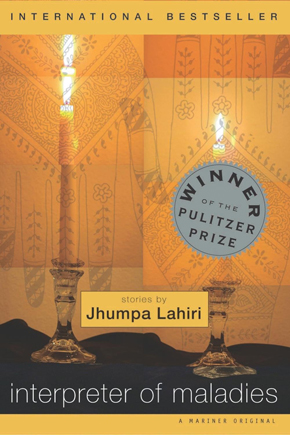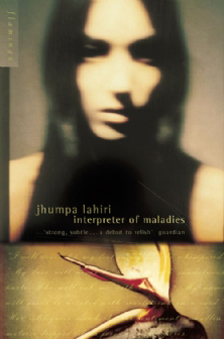Jhumpa Lahiri: ‘The Third and Final Continent’
by Kseniya Melnik Jhumpa Lahiri published her debut collection of short stories, The Interpreter of Maladies, in 1999 – a year after I moved to America from Russia. I remember seeing stacks of that book, with the now iconic orange-yellow jacket, in the Barnes & Noble of Anchorage, Alaska, where I spent a lot of my after-school time studying, reading books, and drinking prodigious amounts of coffee. I also remember stumbling on Ms Lahiri being interviewed by Charlie Rose on TV. It was the first time I saw a real live author. She was so young, so serious, so smart. Back then I didn’t know what a Pulitzer Prize was, or how prestigious it was to be published by The New Yorker; I wasn’t even aware that her first book was a bestseller. I fell in love with Lahiri’s stories as a reader and immediately identified with many of the characters who were immigrants. Although they ate curry instead of borsch, their struggles to assimilate into American society while preserving their native culture were so familiar, so dear to my heart.
Jhumpa Lahiri published her debut collection of short stories, The Interpreter of Maladies, in 1999 – a year after I moved to America from Russia. I remember seeing stacks of that book, with the now iconic orange-yellow jacket, in the Barnes & Noble of Anchorage, Alaska, where I spent a lot of my after-school time studying, reading books, and drinking prodigious amounts of coffee. I also remember stumbling on Ms Lahiri being interviewed by Charlie Rose on TV. It was the first time I saw a real live author. She was so young, so serious, so smart. Back then I didn’t know what a Pulitzer Prize was, or how prestigious it was to be published by The New Yorker; I wasn’t even aware that her first book was a bestseller. I fell in love with Lahiri’s stories as a reader and immediately identified with many of the characters who were immigrants. Although they ate curry instead of borsch, their struggles to assimilate into American society while preserving their native culture were so familiar, so dear to my heart.
As I studied The Interpreter of Maladies at the MFA program at NYU almost ten years after I’d first read the book, I began to appreciate the magnitude of Lahiri’s artistic achievement in a completely different way. I was now an aspiring writer trying to figure out how exactly a handful of words can combine to trigger strong emotion. Lahiri manages to do this without linguistic pyrotechnics, melodrama, clever reversals, or barrages of free-associative imagery that are meant to stand in for feeling or mood. Instead, she pays attention to the seemingly insignificant details of daily life: what clothes the characters wear, what food they eat and how they cook it, what their hands look like, what books they read. Such details create a vivid fictional reality and, while the reader is enjoying the sights so to speak, Lahiri sneaks in rather straightforward statements of emotions. Some call her stories ‘understated’, but I believe it is through this incredible precision in every description that Lahiri reveals her powers of observation and compassion for the most subtle aspects of human drama.
Although I like all of Jhumpa Lahiri’s stories, ‘The Third and Final Continent’ from her debut collection is my favourite. Novelistic in scope and intimate in voice, it has inspired the stories in my own debut collection, Snow in May.
The story opens in 1964, when the narrator leaves India for London. What few particulars we have of his sojourn in a house with other penniless Bengali bachelors are vivid and culturally illuminating: a profusion of egg curry, soaking dishes in a bathtub. In 1969, the narrator’s marriage is arranged, and after his wedding, he moves to the US to work at the library at MIT. We hear nothing of his wife, who remains in India to wait for her immigration papers; instead there are details of his early weeks in Boston, picked with a newcomer’s sharp attention for the new, which is precisely what the narrator’s memory retains years later. Soon he finds a room at $8 per week in a house owned by Mrs Croft, a fierce 103-year-old woman.
“There’s an American flag on the moon, boy!… Isn’t that splendid?” Mrs. Croft bellows almost every day early in his tenancy, and the narrator has to yell in response, “Splendid!” As his relationship with this resilient widow develops, the narrator recalls his mother’s quick mental decline in her own widowhood and her death. Again, the detail is piercing: “Before we cremated her I had cleaned each of her fingernails with a hairpin…”
 The narrator’s wife, Mala, arrives six weeks later and they move to a furnished apartment. They are slow to get used to each other. One day, they visit Mrs Croft, who had broken her hip. Mrs Croft tells them that she called the police. “What do you say to that, boy?” And the narrator cries out “Splendid!” And for the first time, the narrator hears Mala laugh. After scrutinising sari-clad Mala, Mrs Croft, with her Victorian fashion standards, declares her to be a real lady. (Earlier, to her daughter’s question of what she’d do if she left the house and saw a girl in a miniskirt, Mrs Croft has replied that she’d arrest her.) I love the way this set-up pays off: it’s surprising yet perfectly logical. Mrs Croft appreciates modesty. The husband and wife smile at each other. “I like to think of that moment in Mrs Croft’s parlor as the moment when the distance between Mala and me began to lessen,” the narrator says.
The narrator’s wife, Mala, arrives six weeks later and they move to a furnished apartment. They are slow to get used to each other. One day, they visit Mrs Croft, who had broken her hip. Mrs Croft tells them that she called the police. “What do you say to that, boy?” And the narrator cries out “Splendid!” And for the first time, the narrator hears Mala laugh. After scrutinising sari-clad Mala, Mrs Croft, with her Victorian fashion standards, declares her to be a real lady. (Earlier, to her daughter’s question of what she’d do if she left the house and saw a girl in a miniskirt, Mrs Croft has replied that she’d arrest her.) I love the way this set-up pays off: it’s surprising yet perfectly logical. Mrs Croft appreciates modesty. The husband and wife smile at each other. “I like to think of that moment in Mrs Croft’s parlor as the moment when the distance between Mala and me began to lessen,” the narrator says.
The story fast-forwards through the years as the narrator and Mala fall in love with each other, and with America. Again, Lahiri encapsulate shifts of their relationship in a few precise brush strokes. “It was Mala who consoled me when, reading the Globe one evening, I came across Mrs Croft’s obituary… Mrs Croft’s was the first death I mourned in America, for hers was the first life I had admired…” Mrs Croft is a memorable character but also a brilliant way to pivot the narrator’s story.
In later years, the narrator often makes a point to drive by Mrs Croft’s house when he and Mala visit their son at Harvard. “‘Remember?’ Mala says, and smiles, amazed, as I am, that there was ever a time that we were strangers. My son always expresses his astonishment, not at Mrs Croft’s age, but at how little I paid in rent, a fact nearly as inconceivable to him as a flag on the moon was to a woman born in 1866.” The juxtaposition of these vantage points refocuses the story to project an experience much larger than that of one Bengali family. This sentence never fails to move me to tears.
What follows is a tour-de-force ending in which every thread Lahiri has weaved through the story is pulled together into a gorgeous tapestry. ‘The Third and Final Continent’ is destined to become a classic.
 Kseniya Melnik was born in Magadan in the northeast of Russia, and emigrated to Alaska at fifteen. She majored in Sociology at Colgate University then moved to New York City and worked in independent film, classical music PR, pharmaceutical sales, real estate, and at law firms, all the while participating in writing groups and taking creative writing workshops at The New School. She earned an MFA from New York University and taught introductory fiction and poetry there, as well as several private workshops online at Our Stories literary journal. Her work has appeared in The Brooklyn Rail, Epoch, Prospect, Virginia Quarterly Review, and in 2010 was selected for Granta’s New Voices series. She currently lives in El Paso, Texas. Snow in May is published in the UK by Fourth Estate in hardback and eBook. Read a sample story.
Kseniya Melnik was born in Magadan in the northeast of Russia, and emigrated to Alaska at fifteen. She majored in Sociology at Colgate University then moved to New York City and worked in independent film, classical music PR, pharmaceutical sales, real estate, and at law firms, all the while participating in writing groups and taking creative writing workshops at The New School. She earned an MFA from New York University and taught introductory fiction and poetry there, as well as several private workshops online at Our Stories literary journal. Her work has appeared in The Brooklyn Rail, Epoch, Prospect, Virginia Quarterly Review, and in 2010 was selected for Granta’s New Voices series. She currently lives in El Paso, Texas. Snow in May is published in the UK by Fourth Estate in hardback and eBook. Read a sample story.
kseniyamelnik.com
The Interpreter of Maladies is published in the UK by Flamingo.

